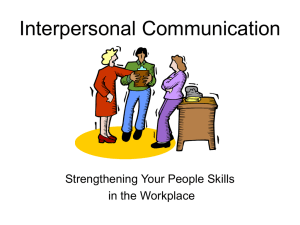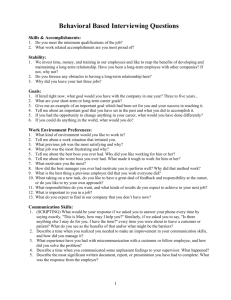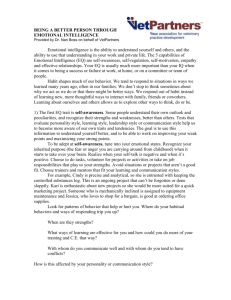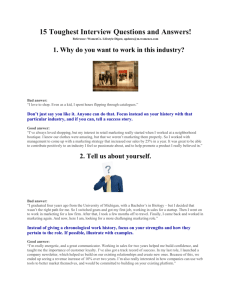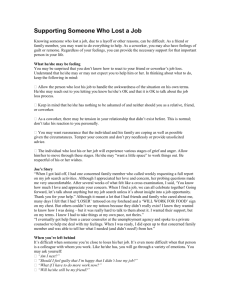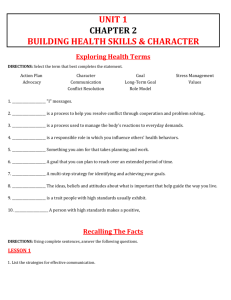communication in conflict
advertisement
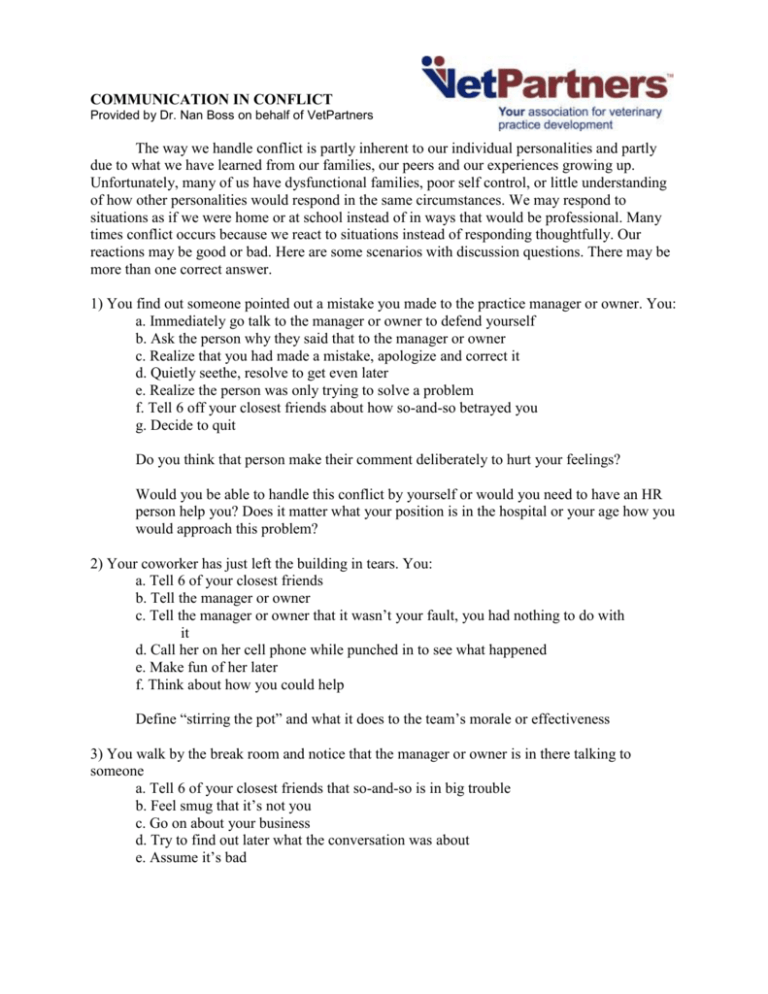
COMMUNICATION IN CONFLICT Provided by Dr. Nan Boss on behalf of VetPartners The way we handle conflict is partly inherent to our individual personalities and partly due to what we have learned from our families, our peers and our experiences growing up. Unfortunately, many of us have dysfunctional families, poor self control, or little understanding of how other personalities would respond in the same circumstances. We may respond to situations as if we were home or at school instead of in ways that would be professional. Many times conflict occurs because we react to situations instead of responding thoughtfully. Our reactions may be good or bad. Here are some scenarios with discussion questions. There may be more than one correct answer. 1) You find out someone pointed out a mistake you made to the practice manager or owner. You: a. Immediately go talk to the manager or owner to defend yourself b. Ask the person why they said that to the manager or owner c. Realize that you had made a mistake, apologize and correct it d. Quietly seethe, resolve to get even later e. Realize the person was only trying to solve a problem f. Tell 6 off your closest friends about how so-and-so betrayed you g. Decide to quit Do you think that person make their comment deliberately to hurt your feelings? Would you be able to handle this conflict by yourself or would you need to have an HR person help you? Does it matter what your position is in the hospital or your age how you would approach this problem? 2) Your coworker has just left the building in tears. You: a. Tell 6 of your closest friends b. Tell the manager or owner c. Tell the manager or owner that it wasn’t your fault, you had nothing to do with it d. Call her on her cell phone while punched in to see what happened e. Make fun of her later f. Think about how you could help Define “stirring the pot” and what it does to the team’s morale or effectiveness 3) You walk by the break room and notice that the manager or owner is in there talking to someone a. Tell 6 of your closest friends that so-and-so is in big trouble b. Feel smug that it’s not you c. Go on about your business d. Try to find out later what the conversation was about e. Assume it’s bad Is a discussion or private conversation likely to be about you or about something/someone else? 4) You notice a mistake a coworker made. You: a. Leave a note in their mailbox b. Leave a note on the manager’s or owner’s desk c. Wait to give a note to the manager or owner personally d. Wait to talk with that person about it the next day e. Ignore it f. Tell 6 of your closest friends that so-and-so made a mistake g. Think about what you could do to help that person make fewer errors or correct the problem h. Teach them how to do it right i. Put it on the staff meeting list so no one else makes the same mistake j. Talk to their mentor about what you found so they can address the problem Who is responsible for correcting mistakes? Does it matter if the mistake is going to affect a patient vs. a client or a coworker? Who will be responsible for training a new employee? Who should you talk to if a mistake was made? How should it be corrected? Let’s walk through a real life example. Here is an example of coaching in a conflict situation, from the Office Coach column in the Milwaukee Journal Sentinel (By Marie G. McIntyre, March 2, 2008) “Q: A colleague is always complaining to my boss about my work without talking to me first. Then I wind up having to defend my position. This colleague is responsible for quality assurance and often tells us that we have to do our work over, even though she has limited knowledge about what we do. My boss is starting to question my ability based on the amount of rework being performed by my group. Help?” Do you see any similarities to situations that have happened in your own work environment? “A: Although your coworker’s behavior is annoying, the fundamental problem here appears to be unclear expectations. Exactly what are the standards that your group is expected to meet? In any organization, those with monitoring responsibilities have a built-in adversarial relationship with the people whose work they oversee. When standards are unclear, resentments grow and relationships deteriorate.” What tools could be used in a practice situation to set standards and expectations? (Such as an office manual) “So here are some suggestions for setting clear expectations: List specific areas where there have been disagreements about work standards Discuss this list with your boss to get his view of expectations If your boss agrees that some standards are not clear, suggest that you, your boss, the QA coworker and her manager get together to agree on a set of standards for your group’s work. At this meeting, discuss issues and agree on a final list of expectations. Suggest that when problems are found, the QA coworker should come directly to you to resolve them. If the two of you cannot agree, then you will involve the managers. If this works, put the list of agreed-upon standards and expectations in writing. Also write down the agreement about how the problem will be handled. And here’s a tip: Separate your feelings about this annoying colleague from the work requirements. You may not like her, but you are stuck with her as long as you both have these roles, so the two of you need to figure out how to work together. Bosses hate to deal with coworker squabbles.” Good advice? So let’s say a couple of you have a dispute over the “right” way to do something. Where would you look or who would you ask to clarify whether there is one correct way or for what that way is? If there isn’t a protocol, standard or procedure in place, who would be responsible for writing one up? Approving it? Medical procedure Customer service procedure Business matters Let’s walk through a real life situation: 1) Your practice owner has hired back an ex-employee for limited part time hours for a short period of time. You don’t like or didn’t get along well with this person. We’ll call her Sue. List some good ways in which you could respond to this situation. List some bad ways. List some reasons why hiring ex-employees might make sense for the business. Now let’s say someone you work with, named Ann, chooses the bad response of “making this person so miserable she’ll quit again.” The hospital manager now needs to sit down with that employee to discuss the problem and the impact it’s having on the business and the team. List 3 alternative explanations for why this dispute is happening, other than “Ann hates Sue.” What might be Ann’s motivation? Help Ann to figure out what her goal is when she sits down to talk to the manager How does this problem impact the business, and what would the manager’s goal be? Sit Ann and the manager across from each other, and walk through the discussion they need to have. Example 2) You don’t think the new receptionist is catching on as fast as she should. You think that she talks too much and doesn’t pay attention when you are trying to teach her something. How does this affect the business? What are some good ways to respond? What are some bad ways to respond What’s the manager’s goal What are 3 explanations for why the receptionist isn’t catching on? What facts would the manager need to gather before speaking to the new employee? Would you involve the new person’s mentor/trainer in the discussion? Why or why not? How should the manager follow - up? THE PROBLEM WITH GOSSIP: Adapted from a column in the Milwaukee Journal/Sentinel by Polly Drew There is gossip in every school corridor and every workplace, and gossiping is one of the most popular recreational activities. Yet it is also a destructive and divisive force, chipping away at morale, teamwork and the atmosphere at work. What exactly is gossip? Isn’t it OK to tell stories or Blaming is a decidedly human share a joke? Gossip is usually information that seems fun activity. While other species if you are the one telling the story but would not be fun if it exact punishment on members were told about you. According to Lori Palatnik, author of who violate rules of group “Gossip: Ten Pathways to Eliminate It From Your Life and behavior, only we humans invest Transform Your Soul,” “Gossip is any form of so heavily in determining who communication that is harmful about another. It also screwed up and how we might speaks volumes about the person doing the gossiping.” make them pay for it. Most people gossip because they want to make Phillip Chard themselves look good by making someone else look bad. Gossip requires the participation of both the teller and the listener. “In some ways, listening is worse than speaking it. The person listening has an opportunity to stop the harmful words.” The passive listener who doesn’t interrupt the gossiper, or politely nods and listens, loses the chance to protect the person being gossiped about. Words hurt. Flip comments and smirks can leave lasting impressions – or scars. Positive comments create positive energy. Negative comments, of course, do the opposite. Here are the Ten Pathways of Positive Speech from Ms. Palatnik’s book: Speak no evil. Make only positive statements. Let words of kindness be on your tongue. Hear no evil. Refuse to listen to gossip, slander and other negative forms of speech. See no evil. Judge people favorably, the way you would want them to judge you. Don’t rationalize destructive speech. Excuses like “But it’s true” or “I’m only joking” or “I can tell my spouse anything” just don’t cut it. Beware of speaking evil without saying an evil word. A roll of the eyes, a wince, a smirk, can hurt at the expense of another. Be humble and avoid arrogance. These are your greatest weapons against destructive speech. Beware of repeating information. Even positive information needs permission before being repeated. Honesty really is the best policy – most of the time. Be careful to always tell the truth, unless it will hurt others, break your own privacy or publicize accomplishments. Learn to say, “I’m sorry.” Everyone makes mistakes. If you’ve spoken badly about someone, clear it up immediately. Forgive. If you’ve been wronged, let it go. Are these Positive Pathways realistic? Achievable? Here are some real life situations involving gossip. How would you respond? What are some good responses and some bad ones? 1) You just had a negative encounter with a client. You: a. Tell everyone in the pharmacy how awful that client was b. Put on a smile and go on to the next appointment c. Try to analyze what went wrong so you can do better with that person next time d. Try to understand the client’s point of view e. Mark PC (for problem client) all over their file f. You ask if someone else gets along with that person better so you can have them speak to the client the next time g. Quietly seethe and hold a grudge 2) You overhear another employee telling someone she feels like she’s being patronized. You: a. Ignore it b. Go tell your manager or practice owner c. Ask if she needs to talk d. Go tell 6 of your closest friends e. Remark how unfortunate it is to your manager in front of 3 other people, pat yourself on the back for letting her know. Go out drinking to talk about it some more f. Talk quietly with the person you think the new coworker is talking about 3) You notice a note on your manager or practice owner’s desk about a mistake a coworker made. You: a. Tell 6 of your closest friends what you saw b. Call the person who the note is about, tell them the person who wrote the note is trying to get them in trouble c. Throw the note in the trash d. Realize it’s none of your business and walk away e. Tell your manager or practice owner the next day that you disagree and the coworker who wrote the note has a grudge against the person the note was about 4) You don’t approve of the way a coworker takes care of their pet. You: a. Tell 6 of your closest friends about it b. Quietly discuss your concerns with that person c. Tell your manager or practice owner d. Feel smug about it, you are so much smarter than they are e. Judge that they don’t deserve a pet f. Ignore it, it’s none of your business g. Put it on the staff meeting list so you can discuss appropriate pet care publicly 5) You notice a coworker has an injury. You: a. Ask what happened b. Figure he/she deserved it, he/she shouldn’t have been doing whatever he/she did to get injured c. Ask what she can and cannot do on the job so you can help him/her compensate d. Quietly seethe because you have to do all his/her work for her e. Publicly complain that you have to do all his/her work for you f. Tell 6 of your closest friends he/she is hurt g. Quietly pitch in and help out 6) Someone makes a comment that you should know something by now. You: a. Read that section of your office manual again b. Get angry, tell everyone you know that so-and-so thinks you are stupid c. Quit d. Go home in tears e. Ask your trainer/mentor what they think f. Ask for help to learn it g. Ignore it It’s obvious when reading these choices which ones we should choose – but so many times we respond in ways that are not ideal simply because we are doing so automatically. It takes time and thought to alter behaviors you have been engaging in for a long time. Between a stimulus and a response there is a split second you can use to think, and to stop your automatic response while you figure out a better one. Those who are driven more by relationships and emotions will struggle to keep thoughts to themselves while quieter or logic-driven personalities will tend towards the cold and quiet. Neither may be an ideal response. We all have emotional triggers that set us off more easily. We need to practice not letting those triggers trip. Who could or should you use as a sounding board to explore better ways to respond? (Venting to coworkers isn’t always a good idea!) HARMFUL WORKPLACE BEHAVIORS There are four behaviors that are predictive of whether a marriage will succeed or fail. In fact, a trained observer can predict, by watching just 30 minutes of video of a married couple interacting with each other, whether their relationship will succeed or fail. These behaviors have a great deal to do with the success or failure of work relationships too. The four things to watch for are contempt, criticism, defensiveness and stonewalling. The most predictive is contempt. If the other party rolls their eyes or sighs when you speak or try to discuss an issue, the relationship is in big trouble. If you sense contempt from a store clerk or other customer service representative how likely are you to return to that store? The same is true here. The quickest way to lose respect with someone is to show contempt either for that person or for others in the work environment. Are you listening respectfully or judging? Some behaviors look like contempt, even if they’re not meant that way, such as not letting another employee try something or not bothering to explain or teach about something. Impatience can also look like contempt. We often have time constraints that explain behaviors that may be seen as contemptuous, but we should never the less guard against this behavior. Bosses and senior clinicians may be very good at contemptuous behavior, especially since they are usually smart, well-educated and self-confident. They can easily answer your question in a way that will make you feel small and stupid, though most try not to do this. Generally, the more tentative, hesitant or cowering your behavior is, the more likely your boss is to snap at you. If you stand up straight, look her in the eye and ask your question in a matter-offact way she usually will treat you with respect. Find your powerful center, because the strong respect the strong and dismiss the weak. Sorry, not nice but true. It’s dominance behavior. Bosses usually do not do the eye-rolling, sighing thing. That is usually the realm of the passive-aggressive, the person who pretends to be nice while really being impatient and dismissive. Sometimes their real feelings show through and they forget to hide their disdain. Most people would rather you look them in the eye and say “That was a really dumb question,” rather than catching the eye rolling out of the corner of their eye. Be honest and up front with your emotions and interactions and you will have more pleasant relationships. The next bad behavior we see or do is criticism. As we know, there is a big difference between constructive criticism and destructive criticism, but it’s easier said than done to do one and not the other. Criticism should be directed at the behavior, not the person, but this, too is difficult sometimes. The more supervisory responsibility a person has the more this issue needs to be managed. Unfortunately, since the doctors are responsible for the health and safety of the patients there are many times that we cannot forego a criticism even if we know it will cause hard feelings. It is much more important to fix a problem that will impair our client service or patient care than it is to preserve someone’s pride. It’s everyone’s job is to try to take criticism gracefully. Try to realize that there is no slight intended, the error simply needs to be pointed out so that it can be corrected. Most people can handle a certain amount of criticism a day or per week before their selfesteem starts to crumble. It’s not a problem to not do everything right, but it’s a big problem when you feel you are doing everything wrong. Abusive people capitalize on that, whittling away at someone until they stop resisting and give up their confidence. Nicer people try to find a balance, and will ask you along the way if you are doing OK or if you need to back off. This is a big issue when we are training someone. When are we just correcting a new person’s mistakes and when are we overwhelming them with negativity? Trainers need to make a conscious effort to praise as well as correct and to see the successes and not just the failures. For detail oriented perfectionists the mistakes are glaringly obvious but the successes aren’t as noticeable. For a relationship-oriented person, success is relating well to the clients. For a goaloriented person, success is reaching the goal, such as completing the medical records with no omissions. These two types of people are seeing job success in a totally different way, thus setting themselves up for disagreement and stress. There is often a lot of emotional baggage that goes along with our responses to criticism. If we had a critical parent or other mentor growing up we may respond very defensively to criticism. If we have a strong or secure self-image it takes a lot to overwhelm us and we handle criticism much more effectively. It’s not just the way criticism is being given to you, it’s how you receive it that is important. Are you able to see it as helpful and constructive or do you automatically respond with self-talk along the lines of “She hates me, I can’t do anything right, my life sucks”? Training and correcting performance mistakes is a kind of delicate dance in which each person tries to find the right balance and respond appropriately to the other person’s feedback. Feedback is often shifts in body language (you may see the person being criticized start to shrink or curl up while the one doing the criticism makes direct eye contact and is leaning forward). If the person receiving criticism stays straight, makes eye contact in return and says “OK, I can do that” the dance ends on a good note. If that person instead starts making excuses, it becomes a longer, less pleasant interaction. This brings us to the third trait that ruins relationships, defensiveness. Defensiveness is common in veterinary practices. When a person is defensive they perceive criticism even when it isn’t there and they may become instantly evasive or make excuses when others try to correct errors or discuss issues. This leads to failure to resolve those issues and eventual deterioration of the relationship past the point where it can be repaired. This is especially a problem when a defensive person tries to work with a critical person. Defensiveness usually comes out as making excuses. Instead of saying “You’re right, I did it wrong, I’ll do better next time,” we give a long list of reasons why we didn’t do it that way. Defensive people should try to modify or slow their defensive responses – again, easier said than done. Defensiveness has the most negative impact on work performance because it impairs a supervisor’s ability to improve your performance. Although some defensiveness is normal and natural, when carried to extremes it leads to big relationship and work performance problems. Those being defensive don’t usually see their behavior as making excuses, they see it as “Explaining the situation.” Unfortunately, this usually doesn’t matter to the person who is trying to get an answer or resolve a problem. We often realize that when we’ve made a mistake with a client or customer we need to just apologize and take care of it, without explaining why the error occurred – because the client doesn’t care why, they just want it fixed. For some reason, we often have a hard time doing this same thing with a coworker. Maybe it’s because we know them better or care more about their opinion, but it’s a mistake to become defensive over a problem or criticism from a coworker just as it’s a mistake to do so with a client. Your coworkers are your internal customers. They don’t want excuses or explanations either, they just want the problem fixed. You will do much better if you always focus on resolution and not on why something happened. The exception to this rule is recurrent or chronic problems. If one client has a bad experience and we fix it then it doesn’t matter how it happened. If three clients this week have complained about the same thing, then you need to get to the bottom to find out why it keeps happening and fix the problem. If you have been criticized several times for the same thing, such as forgetting to enter something in the medical record or neglecting to send a handout home with a client, you need to figure out a way to remind yourself. If you keep being corrected for a workplace error you need to not make excuses but to ask the “five whys.” Figure out what you need to do to make it better, using logic, not emotional fretting that puts your gerbil brain on the wheel. Ask for help if you can’t think of a solution. If you see the same customer service error happening it needs to go on a staff meeting agenda. The last bad trait is stonewalling. Stonewallers pretend that either there is no issue to talk about, and the other person is crazy or abnormal for wanting to discuss it, or else they acknowledge there is a problem and refuse to discuss it anyway. Men are better at stonewalling than women, which is not a compliment, and so do those who are avoiders and have a big fear of conflict. It seems easier to deny there is a problem than to solve it, but of course then things just fester this way. In our mostly women environment, we see stonewalling showing up most commonly as denial of a problem. You go to a management team member complaining of a problem with a coworker. They sit you down with that person and you deny the problem exists because you are afraid. Or you gripe and gripe behind someone’s back but never confront them in person – “Oh, it’s not that big a deal.” Yet it keeps coming up and is obviously needling you and souring your relationship with the other person. “Problem? I don’t have a problem.” As with eye-rolling, this is a passive-aggressive behavior. Honesty is usually the best policy in your interactions with coworkers. Most people would rather discuss and resolve an issue than let it simmer if they think about it rationally. Many of our worst behaviors, however, aren’t particularly rational. Many times we don’t even see ourselves doing them and may be shocked at how we are perceived by others. Just admitting to yourself that you have a tendency towards an un-helpful behavior can be a big step for people. We don’t like to admit that our behavior can have negative affects on others. It takes a lot of time and effort working to modify those negative behaviors. If you don’t acknowledge them in the first place, you cannot improve them. This may mean being open to hearing others tell you where you are falling short and what you could do to improve – a bitter pill to swallow. Those who do swallow it and learn from it, however, are usually the most effective in the workplace and at home. Self-improvement cannot come without self-analysis. Our behaviors are partly shaped by our innate personalities and partly by our life experiences, especially family relationships while we were growing up. Many times we can’t articulate why we do what we do. Our relationship behaviors are learned early in life and are swift, bubbling up from our subconscious minds in the blink of an eye. The best way to modify any of these behaviors is to make yourself pause before speaking, asking yourself “What is the best way I could respond right now?” Realizing you have the tendency toward a bad behavior, which all of us do sometimes, is the first step to modifying your behavior to get along better with others. How does this play out in the workplace or at home? Let’s look at some scenarios. 1) The client comes in to pick up their medication but it’s not ready to go. You didn’t put the file in a bright orange folder when you put it in the pharmacy, as you are supposed to do when something is urgent, so the technician didn’t make it a priority. Now you and the tech are having a heated discussion about how to go about getting medication filled. a. You claim no one ever told you to put the file in a bright orange folder b. You try to blame it on the assistant on duty – though there are three receptionists on that morning and only 1 assistant trying to help two doctors seeing appointments c. You say “I’m sorry, putting it in a bright orange folder sure makes sense. Next time that’s what I’ll do.” d. You put it on the staff meeting list so that the proper procedure will be clarified. e. You type up a protocol to laminate to remind everyone what to do f. You argue about it with both the tech and the receptionist who took care of the client for ten minutes while your blood pressure goes to 180/120, then stew about it for the rest of the morning g. You tell six other people it wasn’t your fault h. You quit in a huff, stating that everyone is unfair to you 2) You are the technician in the above situation. You: a. Snap at the receptionist, telling her “I’m in the middle of an appointment block. If it was urgent she should have put it in a colored folder like she is supposed to.” b. Gripe to the other techs “Even I know that and I haven’t even been to the last three staff meetings.” c. Tell her to put it on the staff meeting list, obviously you are all too stupid to have learned it the first time, we’ll just have to go over it again. d. Tell her to stop arguing with you in the pharmacy and go back to her zone. e. Put it on the staff meeting list yourself. f. Apologize later for snapping at her. g. Try to explain why the protocol is the way it is. h. Fire her ass. i. Feel badly because everyone else’s day was tarnished by the negative interaction in the hallway. j. Resolve to be more patient k. Decide to embarrass her about the incident at the next staff meeting 3) Another associate doctor tells you that you need to do a better job helping out with interpretation of in-house lab test results. You: a. Say, “OK, I’ll pay more attention to that.” b. Demand to know why she thinks so. c. Start keeping score of who does how many lab tests. d. Explain how busy you are, how valuable your skills are to the hospital and that you don’t have enough time to work on the lab list, which sucks. e. Deny it f. Stew about it all day long, snapping at your coworkers and the clients g. Resolve to start seeing these lab tests as a way to make money for the practice and take care of the patients, rather than an intrusion into your day. h. Decide to discuss at the doctors meeting how to distribute lab results and prescription refills more equitably i. Feel proud that you are so good at clinical pathology and resolve to shine even brighter in that area 4) You are the manager in the above situation. When one doctor complains about the other not doing enough lab interpretation you: a. Tell her to quit complaining and get back to work. b. Tell her to handle it herself, it’s between the two of them and not your problem. c. Start secretly counting how many tests each one interprets. d. Tell the accused doctor that “So-and-so says you aren’t doing enough lab interpretation.” e. Discuss the issue quietly when you sit down for your weekly check-in. f. Put it on the doctors meeting list. g. Tell the accused doctor to knock it off and start doing her share. h. Fire the person complaining. i. Fire the person she’s complaining about. j. Fire both of them. k. Tell the boss you quit. l. Ignore the issue, even though this is the fifth time it’s come up. m. Wonder why you took this job in the first place, you can’t believe how petty this crap is. n. Put off talking to her until next week because you know it’s going to be an awkward, uncomfortable conversation. 5) You overhear your coworker saying something extremely negative about your boss. You: a. Take her out to lunch to let her vent. b. Ignore her. c. Tell your manager you are concerned that since you listened to it the comments will come back to bite you in the butt. d. Tell her that her behavior is inappropriate e. Agree with her that the doctor is hateful. f. Pretend you didn’t hear it. g. Tell 6 other people what she said. h. Tell her that she seems to be unhappy with her job and that perhaps she should move on to something she will find more rewarding. i. Tell the manager or doctor that you think the person should be held accountable and that they seem very unhappy with their job. k. Resolve to quit, the atmosphere around here is way too negative. l. Tell the boss it’s her fault this place is so negative. 6) You are concerned about negative conflict between coworkers and feel unable to discuss the issue with them. A couple of coworkers in particular you find very tough to relate to or bring up issues with. You: a. Start quietly looking for another job. b. Resolve to sit down with those people and try to work out a better relationship. c. Tell the management team you are considering leaving. d. Complain loudly about how this place sucks. e. Start keeping a list of grievances. f. Lie in bed at night worrying about it. g. Take more Prozac. h. Quit abruptly, you’ve just had it. i. Read a book on team building, try to implement some ideas to change the situation. j. Put on your big girl panties and handle it like an adult 7) You’ve been pretty tight with a coworker who is becoming more and more disgruntled. You think she has a point but is taking things too far. You want to stay her friend but you also don’t want to get caught in the crossfire. You: a. Tell her you can’t be friends anymore. b. Tell her she’s getting way too worked up about nothing. c. Advise her to take a step back and think about what she is doing. d. Decide to wait for her to hang herself, it’s her problem, not yours. e. Tell her that no matter how she feels, it’s important to stay professional and respectful, otherwise you are sinking to that person’s level instead of taking the high road. f. Talk to the management team about whether this person helps the team. Your personal relationship shouldn’t interfere with what is the best for the practice. g. Resolve that if she quits, you’ll quit too. h. Feel hurt that she’s letting a personal vendetta affect the rest of the team. 8) You ask who is taking the client back to a room and you get a long explanation about who is doing what appointments, why the client is still waiting and what a terrible morning it’s been so far. You: a. Snap “Can’t you just answer the question?” b. Say, “I don’t need excuses, just tell me what I need to know!” c. Say, “Please just tell me who is taking the client back.” d. Listen to the whole thing, hoping you’ll eventually get the answer you need. e. Give up and walk away. f. Take the client back yourself. g. Resolve to coach the person later on how to answer a simple question without becoming defensive. h. Type up a quiz to use at the next staff meeting. i. Complain to the rest of the management team that some people just can’t do anything but make excuses for themselves. j. Ask the manager to fire the person. You’re sick of hearing excuses all the time. 9) Your boss just snapped at you for not answering her question. You: a. Realize you keep answering her questions the same way and it always makes her mad, resolve to take a deep breath and give her the information she wants next time. b. Complain because she’s so critical all the time. c. Figure she must hate you. d. Complain to your manager that the doctor hates you. e. Quit f. Try to get other team members to quit, too. g. Quietly hate her. h. Loudly hate her. i. Cry, you can never do anything right. j. Realize the doctor reminds you of your autocratic father and that you are taking this more personally than you should. Take a step back. k. Read a book on dealing with difficult personalities, try to figure out what type the boss is. l. Ask her if she’s feeling all right or if she’s angry with you about something else. m. Apologize for getting defensive when you know she hates it. 10) You’ve just been corrected for the third time for not writing the pet’s weight on the report card. You: a. Say, “Oh, I forgot.” b. Quick write it on there, feeling resentful that she’s always picking on you. c. Resolve to not make that mistake again, it seems to piss her off. d. Figure out a way to remind yourself to do it so you never have to hear that correction again. e. Ask her why she can’t just write the damn weight down herself? f. Cry. g. Quit. h. Cry, then quit. i. Buy a gun, plan to shoot her if she does it again. j. Blow it off, who cares about the stupid weight anyway. k. Ignore her, she’s always cranky until 10 a.m. 11) You just realized that your new technician forgot for the third time to write the pet’s weight on the report card. You: a. Snap, “Why can’t you ever remember to write the pet’s weight on the report card?” b. Say, “Please don’t forget to write the pet’s weight on the report card,” saying to yourself, “This is only the third repetition, she has two more to go. I hope to God they’re with someone else’s appointment.” c. Write it in yourself, feeling put upon. d. Think, “It’s no use, they never remember even the simplest things.” e. Think, “How many times do I have to go over this? This isn’t rocket science, people.” f. Write her up. g. Shoot yourself, this is the thousandth time this has happened and you can’t take it any more. h. Sigh, roll your eyes. i. Ask her gently, “What are you forgetting again?” j. Feel really guilty you snapped at her. 12) You want to do a good job for the hospital, you feel like you’ve been a loyal employee, yet no one seems satisfied with your work. You: a. Quit b. Try to keep your head down and pretend everything is fine. c. Tell the management team what a good, loyal team player you are. d. Attend a seminar on personal growth, resolve to do better. e. Make a list of problems to discuss solutions with your manager. f. Make a list of tasks you know you do well, have a discussion with management as to whether you could modify your job position to better suit your talents. Maybe you’re in the wrong seat on the bus. g. Tell everyone the boss hates you. h. Make a list of everything you do that generates money for the hospital, to use as evidence. i. Start looking for another job where people will appreciate you, doing the same thing you’re doing now. j. Get some career counseling. k. Think about your skills and your personality style and whether this is the right job for you. Are there tools you could use or a trainer who could help you? l. Finally admit that you have shortcomings that you could be working to address, develop better ways to do your work and be a better team player. Resolve to be positive about change. m. Cry, get an ulcer, bleed to death internally. 13) You’ve seen a coworker undermine “friends” in the past. You don’t want to see the new employee get hurt. You: a. Warn her not to trust your coworker. b. Tell your manager you are concerned that your coworker and the new person are getting too close. c. Tell your coworker you are keeping an eye on her and she should watch her step. d. Feel smug because you can predict the inevitable meltdown of their relationship. e. Can’t believe you keep working in this sick environment. f. Quit in disgust. g. Tell 6 of your closest friends all about it. 14) You’ve just been fired from your job. You: a. Call up 6 of your closest friends to complain bitterly about how unjust it was. b. Resolve to get even. c. Call your boss to beg for your job back. d. Resolve to learn from the experience and become a better person. e. Blame everyone but yourself. f. Blame everything on the fact that the boss hated you. g. Think, “Oops, I guess they were serious after all.” h. Tell every client you meet how unfair it was, hope the clients take their pets elsewhere. i. Figure you would have fired yourself, too, you sure have been acting like a butthead lately. j. Realize you didn’t fit in very well, maybe you’ll find something that fits your personality a lot better. k. Realize you’ve now been fired from 3 different jobs, maybe there’s a pattern here. l. Decide not to pay your vet bill, they’ll never try to collect on it. 15) Work has been kind of sucky and stressful lately. You: a. Take more Prozac b. Take a much-needed vacation c. Buy some cute new socks d. Go out to dinner, have a Margarita e. Fire a few people, that always makes you feel better f. Cry a lot g. Vow to get even h. Take up a new sport or hobby i. Exercise and eat better, get more sleep. Gradually, it doesn’t seem so bad. j. Realize it’s not the job, you are unhappy with yourself k. Ask for more hugs l. Stop showing up one day m. Find another job n. It all starts with you, try to have a better attitude o. Tell everyone at the staff meeting they need to get a better attitude p. Read FISH again q. Meet with your mentor to figure out what you could do to make it better. r. Meet with your manager, tell her this place sucks s. Buy a punching bag t. Take up yoga, you’ve heard it’s relaxing u. Burn your yoga tapes, that crap never worked v. Complain to everyone you know w. Think, “This, too, shall pass.” x. Feel thankful, at least you don’t live in Iraq y. Donate time or money to a good cause z. All of the above CHOICES & DECISIONS STAFF MEETING EXERCISE There are just four ways that a team member can respond to a decision made by the practice owner(s) or the team itself. They are: 1) Agree with the decision and back it 100% 2) Disagree but back it 100% anyway because it’s good for the team or the practice 3) Disagree but keep it to yourself and go along 4) Fight the decision. This includes bad mouthing it, undermining or sabotaging it or refusing to do it It’s acceptable for an employee in any business setting to adopt any of the first three responses. It is never OK for a person employed by a company to choose the number four position. It’s not a good strategy for your job security, for the company or for the team members who work with you. Here are some examples of choices and decisions being made and the responses you might make to them. What would you do in the following situations? What should you be doing instead? 1) You don’t like the scrub tops that were chosen. You: a. Tell 6 of your closest friends you hate the new scrub tops b. Decide to order your own and wear them even though they aren’t the ones chosen c. Complain later to the boss d. Realize it’s not that big a deal and wear them with a smile 2) You realize that charts are due next week and you already feel like there’s too much to do. You: a. Complain to 6 of your closest friends about how unfair it is that you have to do charts b. Gripe about it to anyone who will listen, try to get sympathy because you’re so busy c. Get to work so you have time to start it later in the day d. Refuse to do it because it’s unfair e. Take the EOM book home with you to work on that evening f. Half complete it, then say you didn’t have time g. Put in a callback for 10 weeks later so you remember to start earlier next time h. Quietly seethe and hold a grudge 3) You don’t like the schedule that’s been distributed. You: a. Tell 6 of your closest friends about it b. Quietly discuss your concerns with your manager or owner doctor c. Tell the manager or doctor you hate the new schedule d. Quietly seethe and hold a grudge e. Realize that everyone has some late nights and it’s a fair schedule f. Feel persecuted g. Realize that it’s temporary, and the sooner you get the new people trained the sooner it will get better h. Realize that if you are nice about it and don’t gripe you’ll get a better job review and maybe a raise i. Start making a list of who gets better hours than you do so you have more ammunition 4) You don’t like the new checklists that the manager made. You: a. Decide to give them a try b. Complain to 6 of your closest friends c. Refuse to use them d. Pout e. Figure it’s no big deal f. Wait to see what everyone else will do g. Pretend you don’t know how, refuse to learn how 5) You don’t like the new person much. You: a. Tell 6 of your closest friends you don’t like the new person much b. Complain to your manager that you don’t think the new person is going to work out c. Decide to make the new person’s life miserable so they’ll quit d. Think about whether your dislike is because you feel threatened or uncomfortable about them for some reason e. Realize you don’t have to like someone to work with them f. Decide you’ll reserve judgment until you get to know them better g. Quietly hate them h. Quit 6) Your boss said something at a meeting that you disagree with. You: a. Speak up right away and loudly disagree b. Quietly hate her c. Gripe about it to 6 of your closest friends later d. Decide that she’s the business owner, she gets to make the decisions e. Try to figure out if there is something you could do that would improve on her decision, then bring it up again at the next meeting f. Tell her later that she sucks g. Decide you just aren’t going to do what she wants h. Quit
